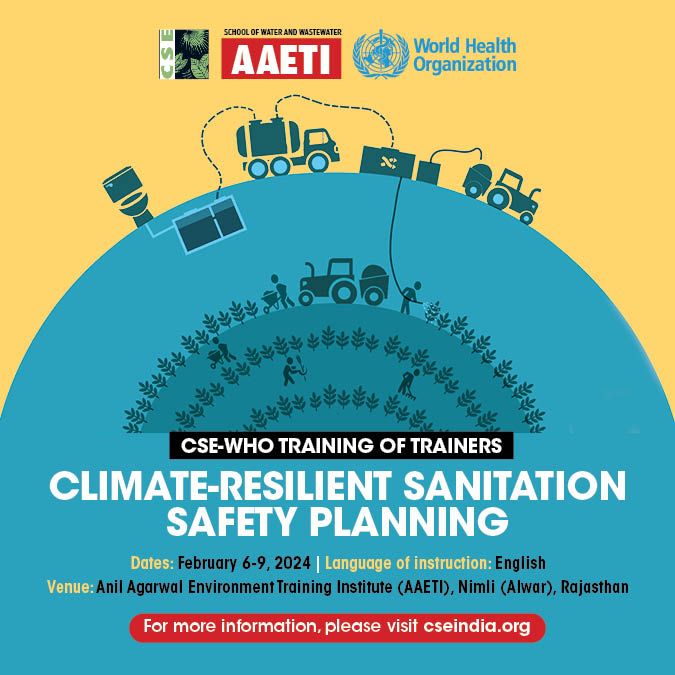CSE-WHO Training of Trainers (TOT) on Climate Resilient Sanitation Safety Planning

![]()
Date: 6th – 9th Feb 24 / Venu : Rajasthan/ Language: English
The Centre for Science and Environment (CSE) is a public interest research and advocacy organisation based in New Delhi. CSE researches into, lobbies for and communicates the urgency of development that is both sustainable and equitable. The scenario today demands using knowledge to bring about change. In other words, working India’s democracy. This is what we aim to do.The challenge, we see, is two-pronged. On the one hand, millions live within a biomass based subsistence economy, at the margins of survival. The environment is their only natural asset. But a degraded environment means stress on land, water and forest resources for survival. It means increasing destitution and poverty. Here, opportunity to bring about change is enormous.But it will need a commitment to reform – structural reform- in the way we do business with local communities. On the other hand, rapid industrialization is throwing up new problems: growing toxification and a costly disease burden. The answers will be in reinventing the growth model of the Western world for ourselves, so that we can leapfrog technology choices and find new ways of building wealth that will not cost us the earth. Our aim is to raise these concerns, participate in seeking answers and in pushing for answers, transforming these into policy and so practice. We do this through our research and by communicating our understanding through our publications. We call this knowledge-based activism. We hope we will make a difference.
Course Fees
For Indian participants:
Rs 25,600 (for double occupancy accommodation)
Rs 28,000 (for single occupancy accommodation)
For international participants:
US $590 (for double occupancy accommodation)
US $760 (for single occupancy accommodation)
Special Offers
50% off for college students and registered NGOs
25% off for industry consultants, and professionals
Who Can Apply?
- National and state-level training entities, PMUs supporting SBM 2.0, AMRUT 2.0, Smart City, National
- Mission for Clean Ganga and HRIDAY Mission
- Public health personnel and sanitary inspectors from urban local bodies
- Practitioners from consultancies, communitybased organisations, social welfare organisations, NGOs
- Independent researchers, academia and key stakeholders working in the WASH sector
The primary objective of sanitation interventions is to protect and enhance public health. Currently, several measures are being undertaken to improve the sanitation status in developing countries – but most of these initiatives do not take public health into account. Rather, the focus is on the ‘hardware’ aspect of sanitation: basically, the provision of services and infrastructure. The planning processes to improve sanitation in most countries fail to integrate public health across all spheres.
There is a need, therefore, for a convergence of regulatory and institutional aspects to approach sanitation from a holistic perspective, which integrates service provision and infrastructure with public health.
Centre for Science and Environment’s (CSE) School of Water and Waste (AAETI), in collaboration with the World Health Organization (WHO), is organizing a four-day Training of Trainers programme on ‘Climate Resilient Sanitation Safety Planning. Step-by-step risk management for safely managed sanitation systems’. This training is based on the second edition of sanitation safety planning tool launched by the World Health Organization (WHO) in 2022, and is in line with the WHO’s 2018 guidelines on sanitation and health at the local authority level.
This training would highlight the importance of managing and investing in improved sanitation systems based on adequate understanding of the actual health risks
Sanitation Safety Planning (SSP) is a risk-based management tool for sanitation systems. It provides a structure to bring together actors and stakeholders from various sectors to identify health risks in the sanitation system and agree on improvements and regular monitoring. The approach ensures that control measures target the greatest health risks and emphasise on incremental improvement over time. SSP highlights the integration of the health sector while reusing wastewater, excreta and grey water, and helps to bring a human health perspective to traditional non-health sectors like sanitation engineering and agriculture.
WHAT DOES THE TRAINING PROGRAMME OFFER?
The programme aims to establish a pool of national and international sanitation players who have in-depth understanding of SSP’s key concepts and principles. In line with this objective, the programme will:
- Help develop an understanding about the SSP process and its importance for all sanitation stakeholders in their respective contexts
- Help build an understanding of the procedure for risk assessment and management in line with WHO guidelines on sanitation and health, covering all steps of the sanitation chain, with or without safe end use
- Help gain an understanding about preparing SSP using step-by-step guidance
- Help develop peer group relations and links to international SSP experts and peers from different regions
TRAINING METHODOLOGY
The training style is based on the ‘Harvard Case Method’, which conveys teaching messages through interactive practical work done by trainees. The training will be focused on experiential learning – including individual/group interaction, practical group exercises, interactions with experts, discussions, and documentary films to highlight the best management practices implemented successfully.
The training programme will also incorporate a field visit to build practical knowledge about the SSP tool.
FOR MORE DETAILS CONTACT:
Anurag Naidu
+91-11-7276497968
Email – Anurag.naidu@cseindia.org

